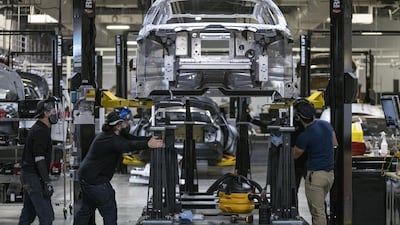California-based electric vehicle maker Lucid Motors, backed by Saudi Arabia’s Public Investment Fund, plans to enter the Middle East market in 2022, its chief executive said, after showcasing the company's first luxury electric sedan Air.
Lucid plans a phased global expansion with Saudi Arabia – the Arab world's largest economy – being its first entry point into the Middle East, chief executive Peter Rawlinson said in an interview with The National.
“Saudi Arabia is a huge market with a vast appetite for cutting-edge technologies. It will drive our growth further,” said Mr Rawlinson, who is the former vice president and chief engineer for Model S at Tesla.
Lucid was founded in 2007 under the name Atieva and was initially focused on building EV batteries. In 2016, it rebranded as Lucid Motors, moved away from being a supplier and pivoted towards making a rival luxury sedan to Tesla. In 2018, the PIF invested more than $1 billion (Dh3.67bn) in Lucid for a majority stake in the company and to help accelerate the manufacturing of its first EV.
The company plans to push into Europe as it expands in the Middle East. The auto maker is considering opening a production facility in Saudi Arabia, Mr Rawlinson said but declined to provide additional details.
“We are discussing that with PIF right now, we are looking to do some industrialisation … [we] really want to do something big there,” he said.
As it looks to scale up, Lucid will produce vehicles at its new factory in Arizona with delivery to the US customers beginning in the first quarter of next year. Customers in the Middle East can pre-order through the company's website by paying a refundable deposit of $1,000. The base model of Air starts at $72,500 and goes up to $161,000.
Lucid aims to produce up to 8,000 units of Air from its Arizona facility next year and then increase that to 25,000 and 34,000 in 2022 and 2023, respectively, Mr Rawlinson said.
“Our next vehicle will be a SUV that will go into production in early 2023. Collectively, we will be producing 80,000 units of sedans and SUVs by the end of that year,” he said.
PIF's backing enabled the company “to get this close to production”, he said. Money is going into car development, the construction of the Arizona plant and establishing sales and a network of stores, he added.
“We probably raise more [money] in order to accelerate our growth and to start working on our next product [SUV]. Within the next 12 months, we will open our office in Saudi,” Mr Rawlinson said.
Other investors of Lucid include Tokyo-based Mitsui and California’s venture capitalist Venrock.

The Air’s launch could challenge the dominance of Tesla – another PIF-backed company – in the EV market.
Tesla is currently the market leader, selling 370,000 units globally last year, according to McKinsey’s EV index. The car maker had a market share of about 16 per cent last year, up from 12 per cent in 2018.
“People love Tesla but their vehicles are not luxurious. We will be a bit high-end than Tesla, but at the same time not too high that our production volumes are low. We want to remain affordable,” said Mr Rawlinson.
“Our comparison with Tesla is quite understandable but our real competition is with gasoline-run luxury auto makers such as Mercedes and BMW,” he said.
The company claims Air will be the fastest-charging EV in the market, with a charging speed of more than 32 kilometres per minute, under controlled conditions.
In real-world conditions on the road, a charge of just 20 minutes should cover up to 483 kilometres.
“No other manufacturer is even close to it … in fact, many EVs don’t even travel that far in a single charge,” Mr Rawlinson said.
The company employs 4,000 staff and aims to add 800 more in the next one year. It is currently not focusing on profits.
“We can be profitable in one year or 18 months … that is not our focus as we are thinking big and want to be a real disrupter. We want to roll out new products and best in-house EV tech, so all the money will be reinvested in scaling further," Mr Rawlinson said.
Lucid may go public in a couple of years, he said, adding that he is not concerned about the downturn in the global economy due to the pandemic.
“We are offering the best car in the world and there is always a market for the best,” a confident Mr Rawlinson said.
“Moreover, there is a new found drive for sustainable mobility … people don’t want to fly so much or travel in train and buses. They want an eco-friendly personal space that is safe from the virus.”









